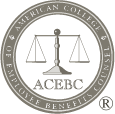ACEBC® History
The newly formed American College of Employee Benefits Counsel (the “College” or “ACEBC®”) gathered for the first time in New York City to induct its Charter Fellows at a gala dinner at Windows on the World in the World Trade Center on July 8, 2000. Fourteen months later, one of the College’s newest Fellows was killed when the World Trade Center was destroyed.
The College was initially a dream of a handful of the leading lights in the benefits community. Months later, the idea started to become reality as the result of the initiative of nine members of the American Bar Association’s (ABA’s) Joint Committee on Employee Benefits, a committee comprised of representatives from the six ABA sections with a substantive interest in employee benefits issues. These nine individuals were selected to begin organizing the College in August, 1999. Induction of the Charter Fellows during the formal founding of the College a year later culminated a year-long celebration of the 25th anniversary of the enactment of the federal employee benefits law known as the Employee Retirement Income Security Act.
The College is a not-for-profit organization dedicated to elevating the standards and advancing the public’s understanding of the practice of employee benefits law. There has never been any other institution devoted to recognizing and encouraging excellence in the field of employee benefits law, and the profession’s waning ability to recognize the excellence of the field’s pioneers was another significant motivating factor in the formation of the College. In continuous pursuit of its goals, the College encourages the study and development of employee benefits laws and initiates professional discussions of significant employee benefits issues. Additionally, the College will continue to recognize the achievements of distinguished employee benefits practitioners.
The Charter Fellows were selected from among hundreds of nominees from around the country, based on criteria developed by the College. Each Charter Fellow was required to have been engaged in employee benefits for at least 20 years and to have demonstrated a sustained commitment to the development and pursuit of public awareness and understanding of the law of employee benefits through such activities as writing, speaking, participating in public policy analysis, public education or public service . The Charter Fellows were also required to have provided exceptionally high-quality professional services to clients, the bar and the public. Concerted efforts were made to recognize a diverse group of Charter Fellows, who ultimately represented all regions of the United States, a wide spectrum of ages, varied ethnic backgrounds and both genders. The Charter Fellows had excelled nationally or regionally in the field and were from a variety of professions engaged in providing or teaching employee benefits. A list of those inducted as the Charter Fellows is available on this website.


